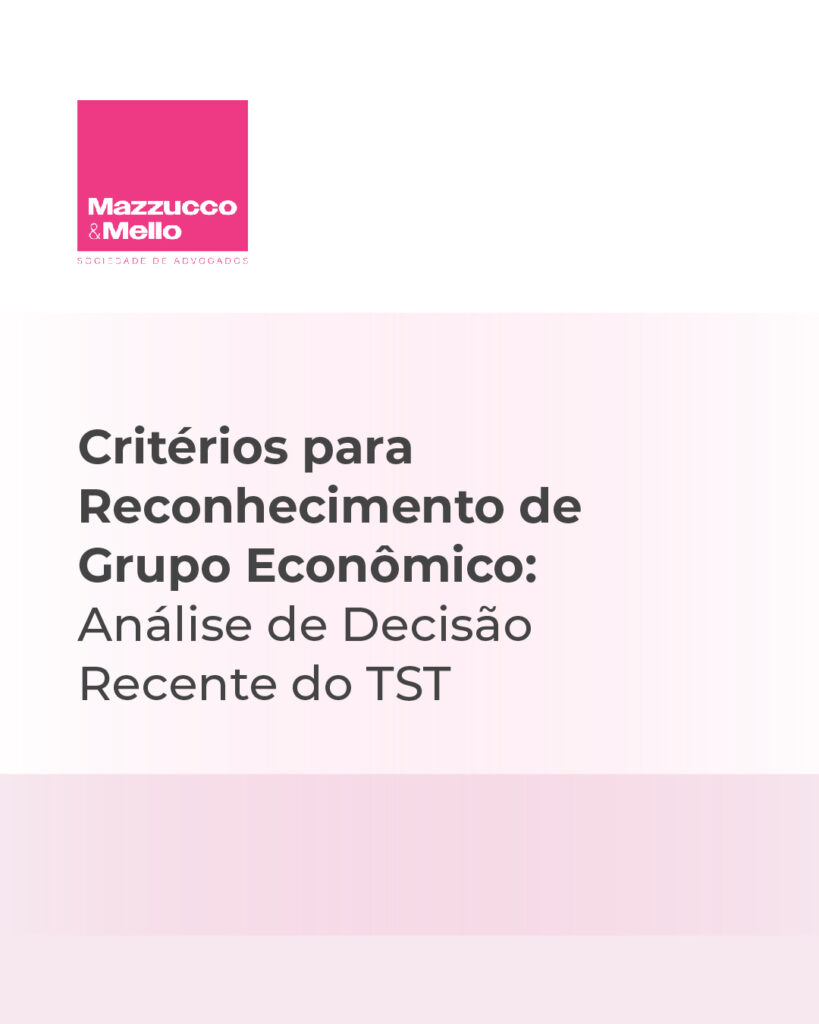Temporary Suspension of S-1200 Events in eSocial: What your company needs to know for January 2025

An important update regarding eSocial has been published to be implemented starting in January of this year. Starting in January 2025, the reception of S-1200 events (Remuneration of Workers linked to the General Social Security Regime) is temporarily suspended. The reason for this suspension is the need to update the salary ranges that […]
Criteria for Recognition of Economic Group: Analysis of Recent TST Decision

Within the scope of legal relations prior to the Labor Reform (Law 13,467/2017), the consolidated jurisprudence of the Superior Labor Court (TST) highlights that, in order for an economic group to be recognized, it is essential to prove hierarchical subordination between the companies involved, with the demonstration of effective control by a leading company over the […]
Differences Between Medical Certificates and Attendance Statements: What You Need to Know

In employment relationships, situations of absence due to health reasons are common, but it is essential that employers and employees understand the differences between medical certificates and attendance statements, since these documents have different purposes and legal effects. A medical certificate is issued by a qualified professional and proves the employee’s incapacity […]
Procedural implications of employee geolocation monitoring

In a recent decision by the Labor Court of Embu das Artes-SP, a worker was ordered to pay fines for bad faith litigation and an act that undermined the dignity of the courts. The case involved a complaint about overtime, where the plaintiff alleged that, after clocking in, he continued to perform his duties. However, a detailed investigation, […]
STF Confirms Constitutionality of Intermittent Employment Contract

In the virtual plenary session, the majority of the ministers of the Federal Supreme Court (STF) voted for the constitutionality of the intermittent employment contract, a model introduced by the labor reform (Law 13,467/17). So far, seven ministers have spoken out in favor of the validity of the provision, while two others have spoken out against it, in actions that question the modality. The Intermittent Employment Model […]
Brazilian companies must assess psychosocial risks from May 2025

Starting in May 2025, all Brazilian companies will be required to include psychosocial risk assessment in their Occupational Health and Safety (OHS) management processes. This requirement is the result of the update of Regulatory Standard No. 1 (NR-1), promoted by the Ministry of Labor and Employment (MTE) in August 2024. Risks […]
Monetary Update and Interest on Labor Debts: What Should Employers Know?
In recent months, the Brazilian labor law scenario has undergone significant changes, especially with regard to monetary correction and interest applicable to labor debts. These changes directly impact employers, requiring more strategic management of labor liabilities and careful adaptation to the new rules established. TST Decision and Legislative Changes The […]
Notifications via the Electronic Labor Domicile (DET) in Electronic Processes of Labor Violation Reports and Debt Notifications
As of October 1, 2024, all notifications related to electronic processes will be made exclusively through the Electronic Labor Domicile (DET). Therefore, it is essential that employers keep their email addresses updated and duly registered with the DET, ensuring that they receive notices about the publication of notifications in the […]
TST and STF Determine Right to Fortnightly Sundays Off for Employees
The Superior Labor Court (TST) and the Federal Supreme Court (STF) have ruled in favor of the right to a fortnightly day off on Sundays for female employees. The decisions are based on article 386 of the Consolidation of Labor Laws (CLT), which establishes a specific protection rule for female workers, requiring a fortnightly rotation in cases of […]
Digital CTPS Updates Position Display for More Transparency
The Digital Employment and Social Security Card (CTPS) has undergone an update that aims to ensure greater accuracy in displaying workers’ positions. Previously, the application only displayed the CBO (Brazilian Classification of Occupations) code, which did not always reflect the worker’s exact function. Now, the system displays the job description […]